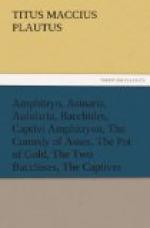Here is a man (patting his chest) that is worth his weight in gold: here is a man who ought to have a gold statue set up for him. Why, I’ve done a double deed to-day, been graced with double spoils. The old master—how cleverly I did take him in to-day, how he was fooled! Wily as the old chap is, my wily arts impelled him and compelled him to believe me in everything.
nunc amanti ero filio senis, quicum ego bibo, quicum edo et amo, regias copias aureasque optuli, ut domo sumeret neu foris quaereret. non mihi isti placent Parmenones, Syri, qui duas aut tris minas auferunt eris. 650
And now the young master that’s in love, the old one’s son, that I drink with and eat with and go a-courting with—I’ve furnished him out with regal supplies, golden supplies, so that he can go to himself for cash and not look for it outside. I haven’t any use for those Parmenos,[I] those Syruses[I] that do their masters out of two or three gold pieces.
[Footnote I: Rascally slaves in Greek comedies.]
nequius nil est quam egens consili servos, nisi habet multipotens pectus: ubicumque usus siet, pectore expromat suo. nullus frugi esse potest homo, nisi qui et bene et male facere tenet.
There’s nothing more worthless than a servant without brains: he’s got to have a precious powerful intellect: whenever a scheme is needed, let him produce it from his own intellect. Not a soul can be worth anything, unless he knows how to be good and bad both.
improbis cum improbus sit, harpaget, furibus furetur quod queat, vorsipellem frugi convenit esse hominem, pectus quoi sapit: bonus sit bonis, malus sit malis; 659-660 utcumque res sit, ita animum habeat.
He must be a rascal among rascals, rob robbers, steal what he can. A chap that’s worth anything, a chap with a fine intellect, has to be able to change his skin. He must be good with the good and bad with the bad; whatever the situation calls for, that he’s got to be.
sed lubet scire quantum aurum erus sibi dempsit et quid suo reddidit patri. si frugi est, Herculem fecit ex patre: decimam partem ei dedit, sibi novem abstulit. sed quem quaero optume eccum obviam mihi est.
(pausing) But I should like to know how much money master took for himself and what he passed on to his father. If he is worth anything, he has let his father play Hercules— given him a tithe and made off with nine parts for his own use. (sees Mnesilochus and Pistoclerus) Hullo, though! Here’s a lucky meeting with the man I’m looking for!
num qui nummi exciderunt, ere, tibi, quod sic terram optuere? quid vos maestos tam tristesque esse conspicor? non placet nec temere est etiam. quin mihi respondetis? 670
(to Mnesilochus) You haven’t dropped any of the coin, have you, sir,—gazing at the ground that way? (waits for answer) What makes you two look so sad and gloomy? (waits again) I don’t like it: no indeed, it’s not for nothing. (waits again) Why don’t you answer me?
Mnes.




